

|
|
Mr Forbush and the Penguins AKA Cry of the Penguins
R2 - United Kingdom - Network Review written by and copyright: Paul Lewis (11th September 2013). |
|
The Film
 Mr Forbush and the Penguins AKA Cry of the Penguins (Roy Boulting, Arne Sucksdorff & Alfred Viola, 1971) Adapted from Graham Billing’s 1965 novel Forbush and the Penguins, with a screenplay by the revered playwright Anthony Shaffer, Mr Forbush and the Penguins – also released in America under the title Cry of the Penguins – was a troubled production. A major change of direction during the production of the film results in an uneven little picture that is not without interest, largely thanks to the performance of John Hurt as Forbush (and the supporting cast, including Dudley Sutton as Forbush’s university friend Starshot). 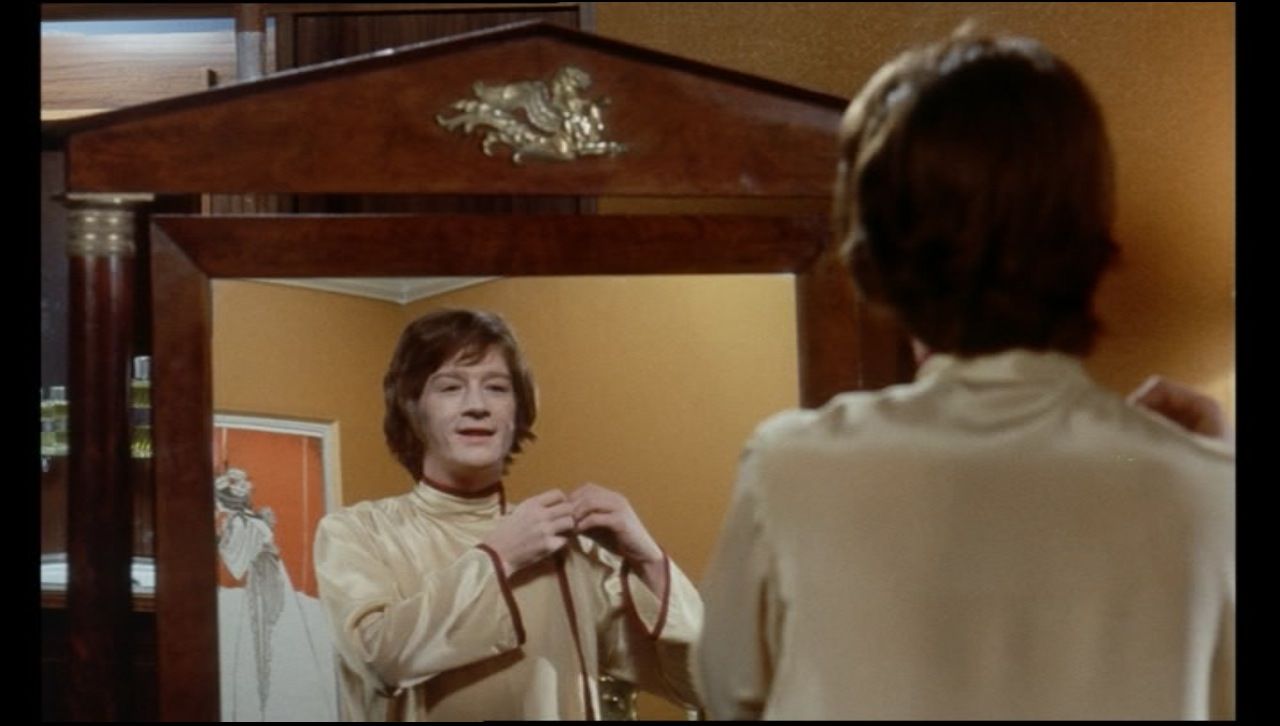 As the film opens, Forbush is a postgraduate student specialising in biology. He lives a cushy lifestyle, financed by his wealthy father (Thorley Walters), and his lecturers are frustrated by his lack of willingness to commit himself to his studies. He is first introduced when, in the opening sequence, during a university awards ceremony he is announced as the winner of the Ashdown Prize for Ecological Biology. When Forbush doesn’t come to the stage to claim his prize, one of his lecturers announces authoritatively, ‘Mr Forbush’, and the film cuts to a leather sofa. Again, on the soundtrack, Forbush’s presence is demanded by his lecturer; a girl, Jackie (Sally Geeson), appears from behind the sofa, clad only in a bra. ‘Mr Forbush, Mr Forbush?’ she asks. ‘I heard you, sweetheart’, Forbush, who is standing by a full-length mirror, states. The sequence deftly outlines Forbush’s character: his vanity is signified by his appearance next to a mirror (and the insistence that Jackie, with whom we must assume Forbush has shared an intimate moment, refer to him as ‘Mr Forbush’ – the only person who addresses Forbush informally is Fanny, the landlady of the local pub, played by Avril Angers); and his arrogant self-interest is signalled in his dismissive attitude towards Jackie. As the film opens, Forbush is a postgraduate student specialising in biology. He lives a cushy lifestyle, financed by his wealthy father (Thorley Walters), and his lecturers are frustrated by his lack of willingness to commit himself to his studies. He is first introduced when, in the opening sequence, during a university awards ceremony he is announced as the winner of the Ashdown Prize for Ecological Biology. When Forbush doesn’t come to the stage to claim his prize, one of his lecturers announces authoritatively, ‘Mr Forbush’, and the film cuts to a leather sofa. Again, on the soundtrack, Forbush’s presence is demanded by his lecturer; a girl, Jackie (Sally Geeson), appears from behind the sofa, clad only in a bra. ‘Mr Forbush, Mr Forbush?’ she asks. ‘I heard you, sweetheart’, Forbush, who is standing by a full-length mirror, states. The sequence deftly outlines Forbush’s character: his vanity is signified by his appearance next to a mirror (and the insistence that Jackie, with whom we must assume Forbush has shared an intimate moment, refer to him as ‘Mr Forbush’ – the only person who addresses Forbush informally is Fanny, the landlady of the local pub, played by Avril Angers); and his arrogant self-interest is signalled in his dismissive attitude towards Jackie.
Visiting the local pub, Forbush is enchanted by the new barmaid, Tara (Hayley Mills). However, Tara recognises Forbush as an arrogant womaniser and dismisses his attentions. Despite this, Forbush continues to pursue her, and when his professor (Tony Britton) offers him the opportunity to spend six months in the Antarctic documenting the penguin population there, he takes the position – less out of interest in his studies and more out of a desire to impress Tara. Forbush will be staying at Shackleton’s hut in Cape Royds; his preparations for his visit to the Antarctic see him acquiring all of the mod cons, and taking with him a huge wardrobe and stores of liquor and rich food. However, once in the Antarctic Forbush begins to become fascinated by the penguin population and soon abandons the ridiculous vinyl jacket and sun visor that he has bought for his journey, eventually ending the film dressed in furs and with a straggly beard. Forbush’s growing interesting in the penguins sees him develop as a person, leaving behind his vanity and materialism. These changes in his character are evidenced through a clever narrative device: the letters and voice recordings he sends back home to Tara. 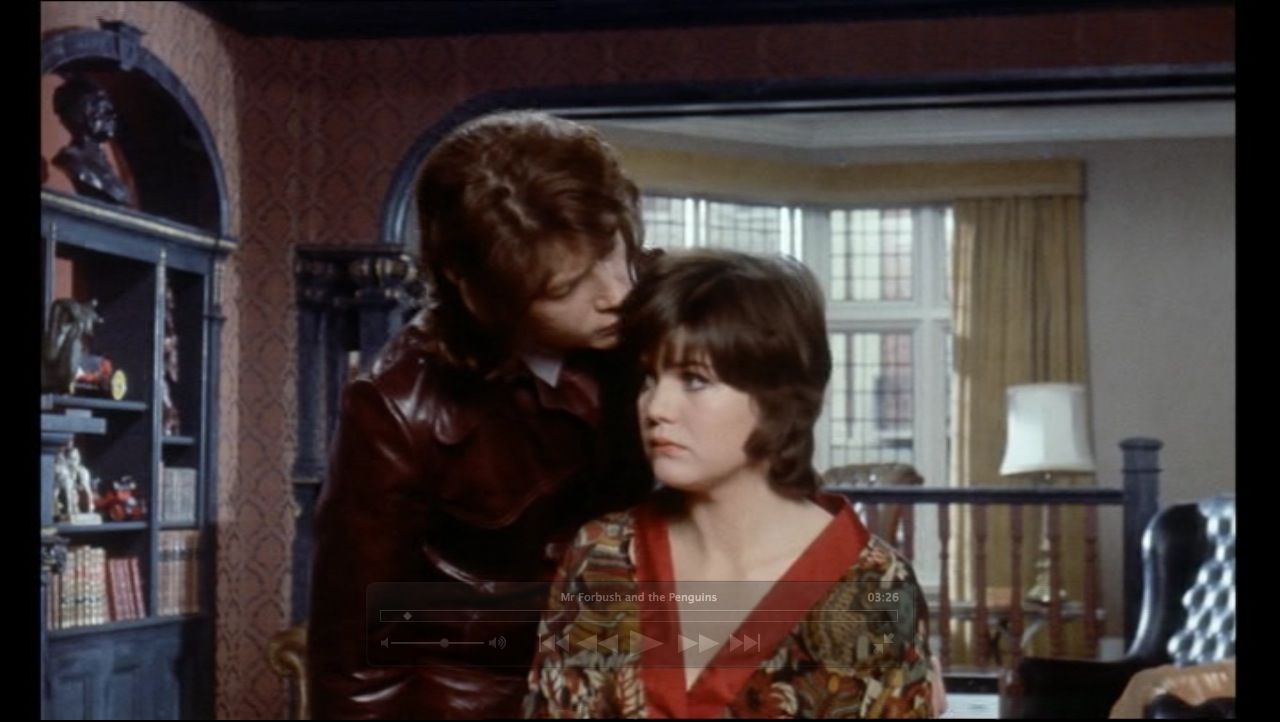 Billing’s book was based on his own experiences in the Antarctic, and when the film began production in December of 1969 director Al Viola and Shaffer, whose play Sleuth was on its way to becoming a big hit, intended to offer a fairly straight adaptation of Billing’s book. The novel focused on the trials and tribulations faced by a young man (in the novel, a New Zealander), alone in the Antarctic, who is given the task of documenting the local penguin population. Footage of the penguins in their natural habitat was shot by acclaimed Swedish documentary filmmaker Arne Sucksdorff (the film was actually Sucksdorff’s last) and was intercut with footage of Forbush shot at Elstree Studios. The producers felt that Sucksdorff’s footage did not integrate well with the narrative footage shot at Elstree, and Viola was replaced as director by Roy Boulting (who remains uncredited in the film). Billing’s book was based on his own experiences in the Antarctic, and when the film began production in December of 1969 director Al Viola and Shaffer, whose play Sleuth was on its way to becoming a big hit, intended to offer a fairly straight adaptation of Billing’s book. The novel focused on the trials and tribulations faced by a young man (in the novel, a New Zealander), alone in the Antarctic, who is given the task of documenting the local penguin population. Footage of the penguins in their natural habitat was shot by acclaimed Swedish documentary filmmaker Arne Sucksdorff (the film was actually Sucksdorff’s last) and was intercut with footage of Forbush shot at Elstree Studios. The producers felt that Sucksdorff’s footage did not integrate well with the narrative footage shot at Elstree, and Viola was replaced as director by Roy Boulting (who remains uncredited in the film).
Boulting added a number of extra scenes set in England, taking place before Forbush’s expedition to the Antarctic and establishing his motives for going on the trip, which were shot at Shepperton Studios (and which may or may not have been contributed to by Shaffer). The role of Forbush’s romantic interest, Tara, was significantly expanded and recast: the part had originally been given to Susan Fleetwood, but Boulting replaced Fleetwood with his wife Hayley Mills. The footage of Forbush in the Antarctic was pruned to make way for a greater focus on Forbush’s pursuit of Tara. Boulting also apparently insisted on turning the character of Forbush, who in Shaffer and Viola’s version was ‘hard, rude and obnoxious’, into a more sympathetic ‘comical, promiscuous, free-loving spirit’ (Taylor, 2010: np). The result is a very uneven film of essentially two halves: the London sequences don’t successfully bridge with the sequences depicting Forbush’s adventure in the Antarctic. Because Hurt’s performance is a major strength of the film, along with Sucksdorff’s amazing footage of the penguins, it has to be said that the sequences showing Forbush studying the penguin colony - despite the clear differences between Sucksdorff’s location footage and Viola’s clearly studio-bound material - are much more interesting than the London-set sequences directed by Boulting. On the other hand, the footage shot at Shepperton underscores the development of Forbush’s character during the Antarctic sequences, and thus serves an important narrative function. Boulting’s decision to soften the character of Forbush led Richard Combs, in Film Bulletin Magazine, to assert that ‘[t]he surviving Antarctic material features some realistically gruelling action; but the central character is now reduced to the abbreviated, caricatured motions of a clown, comic and tragic by unconvincing turns’ (Combs, quoted in Taylor, op cit.: np). Ultimately, because of this, Mr Forbush and the Penguins is an often fascinating but frequently frustrating little film. Elizabeth Leane notes that in Billing’s novel, Forbush must endure the hardships of life in the Antarctic – including a blizzard, which is also depicted in the film – but ultimately, ‘his hardihood is never really in question; rather, it is his philosophical outlook that transforms during the summer’ (2012: 141). Forbush begins his adventure with disinterest but becomes increasingly protective of the penguins, especially when their eggs and chicks are attacked by the skuar birds. Leane adds that the film adaptation heightens Forbush’s lack of preparedness for his journey to the Antarctic. Noting that ‘a narrative of an unprepared urbanite who travels to Antarctica is dramatic and potentially amusing in a way that narratives of more “ordinary” Antarctic workers are not’, Leane suggests that the film ‘exaggerates’ Forbush’s transformation: in the film, ‘Forbush’s initial dandification […] made way for his masculinization – a process of becoming more serious and capable, better fitted for his female partner at home’ (ibid.: 147). In a review of Billing’s novel for Life magazine, Franklin Russell notes that Forbush finds himself on a ‘backwards journey’: during his time in the Antarctic, ‘he is reduced, step by step, to the same life-equation as the penguins—keeping warm, filling the gut, surviving the snow, ice and predators. It is a journey in reverse, with its destination the womb [….] At first, locked in an environment stupefyingly bleak and hostile, Forbush suspects that he is going wilderness-crazy. Then, backtracking, he discovers that he is actually recovering from an insanity of civilization’ (1966: 12). This ‘backwards journey’ is present in the film but downplayed, possibly because of the cuts to the Antarctic-set sequences reputedly made when Viola left the production. The addition/expansion of the London-set sequences at the front of the film (and several shorter sequences, interspersed throughout the film, in which Tara listens to the recordings Forbush has sent her, acting as a mirror for his change of heart towards the penguins) also arguably have the effect of shifting the focus away from Forbush’s struggle for survival in the Antarctic wilderness, and his realisation of the ‘insanity of civilisation’, and onto his development away from a self-interested, womanising fop towards, as Leane suggests, a ‘more serious and capable’ man. In other words, Forbush’s experiences in the Antarctic are, in the final film, placed in the service of a more simple character ‘arc’: Forbush’s transformation from a vain, selfish womaniser (‘That’s all you are: wind, empty wind’, Tara tells him early in the film) into a more emotionally mature and more fitting romantic partner for Tara. Whether or not this has the effect of trivialising the ideas in Billing’s original novel may depend on the viewer’s point of view. 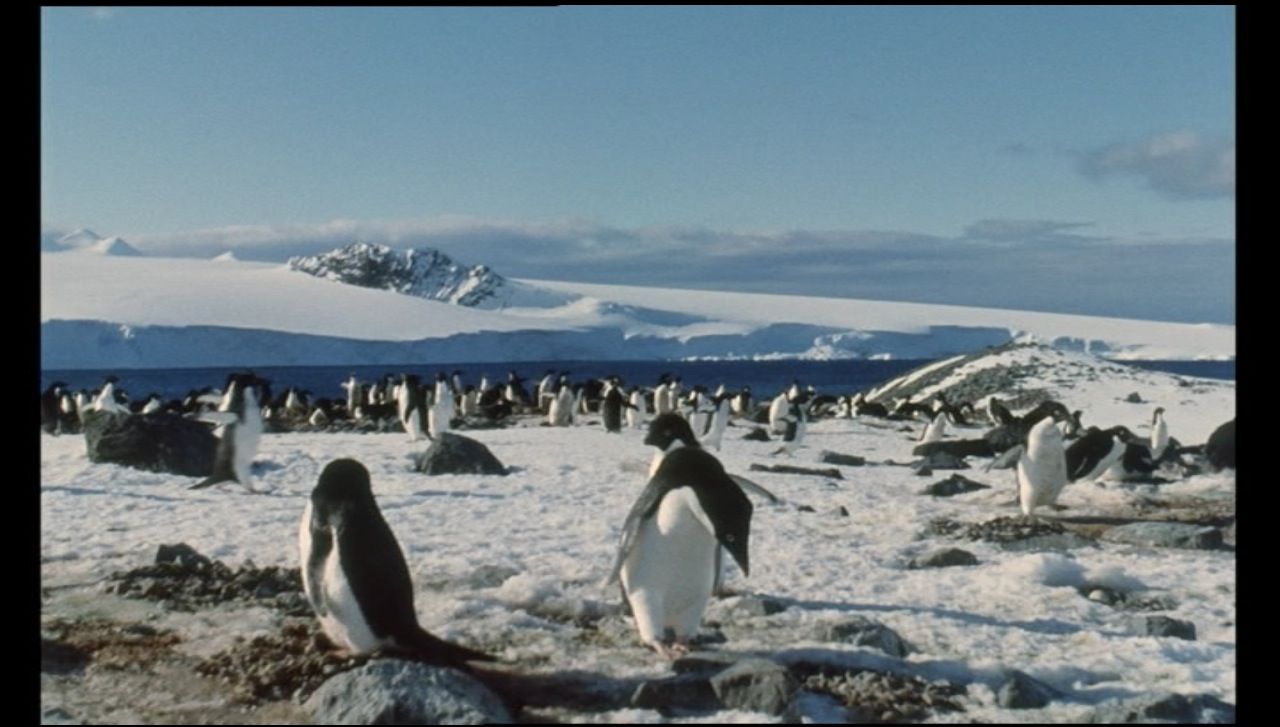 The development of Forbush’s attitude towards the penguins is one of the film’s strengths. Hurt’s performance subtly highlights the nuances of Shaffer’s script. When Forbush first arrives in the Antarctic, he is full of resentfulness towards the penguins. ‘Well, if they’re so strapped of the life force that they have to find their way back here to this refridgerated graveyard every year, that’s their bad luck. God, I wish they’d get here and get it over’, he complains whilst waiting for their arrival. However, he is filled with joy when he spots the first penguin. ‘Most revered and welcome bird, I greet you’, Forbush says as the penguin waddles towards him. Then more penguins arrive, leaping out of the water: the humour of their movements is reinforced by playful music and sound effects. This is a bravura sequence, a clear highlight of the film, thanks to the wonderful photography by Sucksdorff. The development of Forbush’s attitude towards the penguins is one of the film’s strengths. Hurt’s performance subtly highlights the nuances of Shaffer’s script. When Forbush first arrives in the Antarctic, he is full of resentfulness towards the penguins. ‘Well, if they’re so strapped of the life force that they have to find their way back here to this refridgerated graveyard every year, that’s their bad luck. God, I wish they’d get here and get it over’, he complains whilst waiting for their arrival. However, he is filled with joy when he spots the first penguin. ‘Most revered and welcome bird, I greet you’, Forbush says as the penguin waddles towards him. Then more penguins arrive, leaping out of the water: the humour of their movements is reinforced by playful music and sound effects. This is a bravura sequence, a clear highlight of the film, thanks to the wonderful photography by Sucksdorff.
As Forbush becomes familiar with the penguins’ patterns of behaviour, he notes (in one of the audio recordings he makes for Tara), ‘I admire these little birds more every day’. He is exuberant when he sees one of the penguins sitting on an egg. ‘The first, the very first egg’, he exclaims happily. When company arrives in the form of three Americans in a helicopter, Forbush greets them with anger rather than joy: their helicopter has frightened the penguins, causing the colony to scatter. ‘Well, what’d ya know?’, one of the Americans asserts when Forbush points this out to them. ‘I know that it’s unimaginably difficult for the penguins to walk thousands of miles across the sea and ice on three inch legs and spend forty days starving while they court a wife, copulate, incubate and build a nest before they can get back to the sea and break their fast. I also know that what makes it incredibly more difficult for them is to be blown out of their nest by a bloody helicopter’, Forbush says angrily. Forbush’s friend Star also arrives at Forbush’s camp, and Forbush expresses his bitterness at the skuar birds that have been feeding on the penguins’ eggs (and, later, their chicks). ‘They’re just creatures, Dick’, Star protests: ‘like any other, they have to live’. ‘Who needs that? I could wring their bloody necks, feed them eggs filled with prussic acid’, Forbush asserts. Star tells Forbush that whilst Forbush’s stay in the Antarctic will last six months, Star has been commissioned to study a neighbouring penguin colony for nine months. ‘Nine months is a long time’, Forbush says. ‘Soon passes, if you’re not thinking about something else’, Star adds. ‘You know, you’re a thick-skinned sort of a fellow, Star’, Forbush says. ‘What’s wrong with that? At least I know what’s real and can stay objective’, Star adds, suggesting Forbush is becoming too wrapped-up in the penguins’ ongoing struggle with the skuar birds: ‘Don’t take the birds too seriously, especially not these birds. Save it up for Tara’. 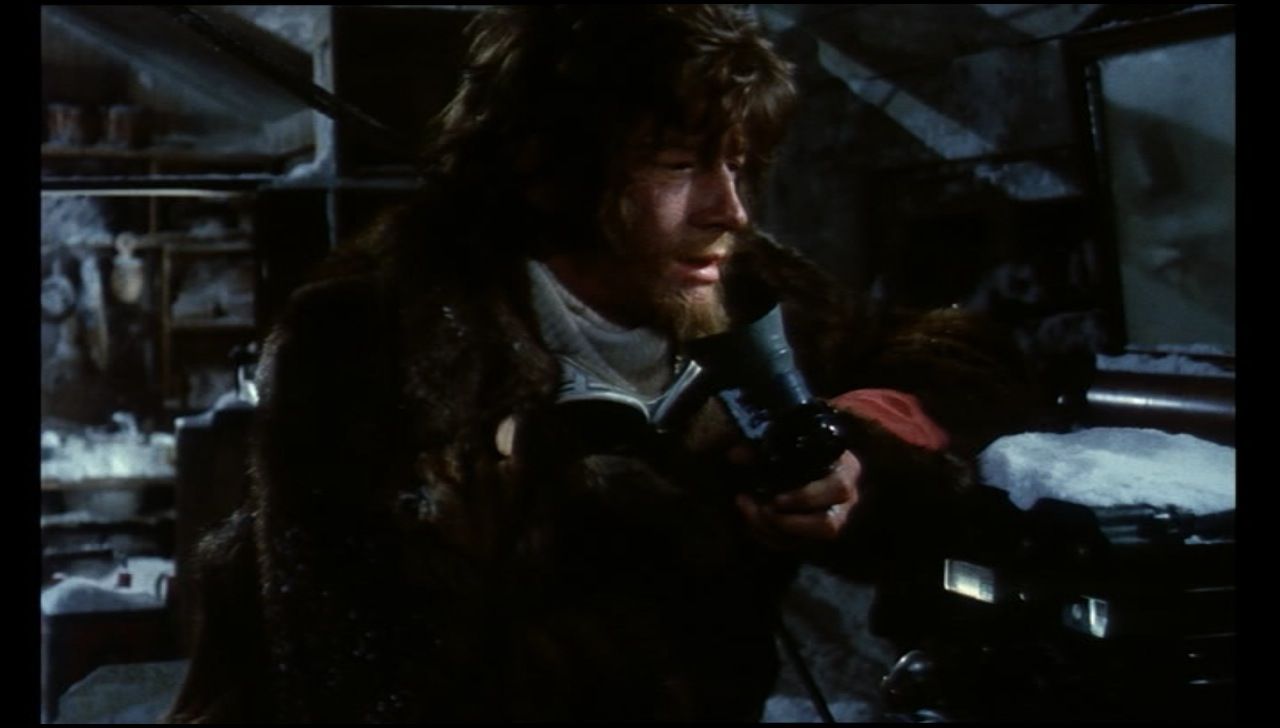 Forbush builds a catapult, which he intends to use against the skuar birds. He drags the device to the skuar bird colony and uses it to scatter the skuars. However, he soon realises that the task is futile. ‘What’s happened to me? Have I gone mad or something?’, Forbush reflects: ‘What about next month, next year?’ However, Forbush soon remembers a lecture he attended earlier in the film: lying in his bed in the cabin, he remembers the lecturer’s words (which we hear on the soundtrack): ‘The skuars say, in effect, to the penguins: we’ll keep the other skuars off in return for a fair share of your eggs and chicks. In this way, nature ensures the survival of a sufficient number of penguin chicks, a providence not to be despised by the thinking scientist’. Producing another recording for Tara, Forbush realises that ‘the skuars have a place in the system too, like anything else. Yes, there is a pattern, Tara. Funny, isn’t it. The one unselfish and completely disinterested act of my life was when I tried to change it. I failed, of course, and I deserved to. Who was I to take it upon myself to put the balance right?’ At home, Tara listens to the recording; her current suitor mocks Forbush (‘If you ask me, I think he’s been alone too long [….] After all, they’re only bloody penguins’). Angrily, Tara demands the young man leave her flat. Finally, at the end of the film, Forbush watches the penguins swim away, reflecting that they’ll ‘be back next year [….] And so it’ll go on, as long as there are penguins and skewers and the will to survive. And what have I learned from it all? That every living creature depends in some way on another. Humans too’. Forbush builds a catapult, which he intends to use against the skuar birds. He drags the device to the skuar bird colony and uses it to scatter the skuars. However, he soon realises that the task is futile. ‘What’s happened to me? Have I gone mad or something?’, Forbush reflects: ‘What about next month, next year?’ However, Forbush soon remembers a lecture he attended earlier in the film: lying in his bed in the cabin, he remembers the lecturer’s words (which we hear on the soundtrack): ‘The skuars say, in effect, to the penguins: we’ll keep the other skuars off in return for a fair share of your eggs and chicks. In this way, nature ensures the survival of a sufficient number of penguin chicks, a providence not to be despised by the thinking scientist’. Producing another recording for Tara, Forbush realises that ‘the skuars have a place in the system too, like anything else. Yes, there is a pattern, Tara. Funny, isn’t it. The one unselfish and completely disinterested act of my life was when I tried to change it. I failed, of course, and I deserved to. Who was I to take it upon myself to put the balance right?’ At home, Tara listens to the recording; her current suitor mocks Forbush (‘If you ask me, I think he’s been alone too long [….] After all, they’re only bloody penguins’). Angrily, Tara demands the young man leave her flat. Finally, at the end of the film, Forbush watches the penguins swim away, reflecting that they’ll ‘be back next year [….] And so it’ll go on, as long as there are penguins and skewers and the will to survive. And what have I learned from it all? That every living creature depends in some way on another. Humans too’.
The film is uncut and runs for 97:58 mins (PAL).
Video
The film is presented in its original aspect ratio of 1.66:1, with anamorphic enhancement. The transfer has good contrast and colour consistency. This is a very satisfying presentation of the film. 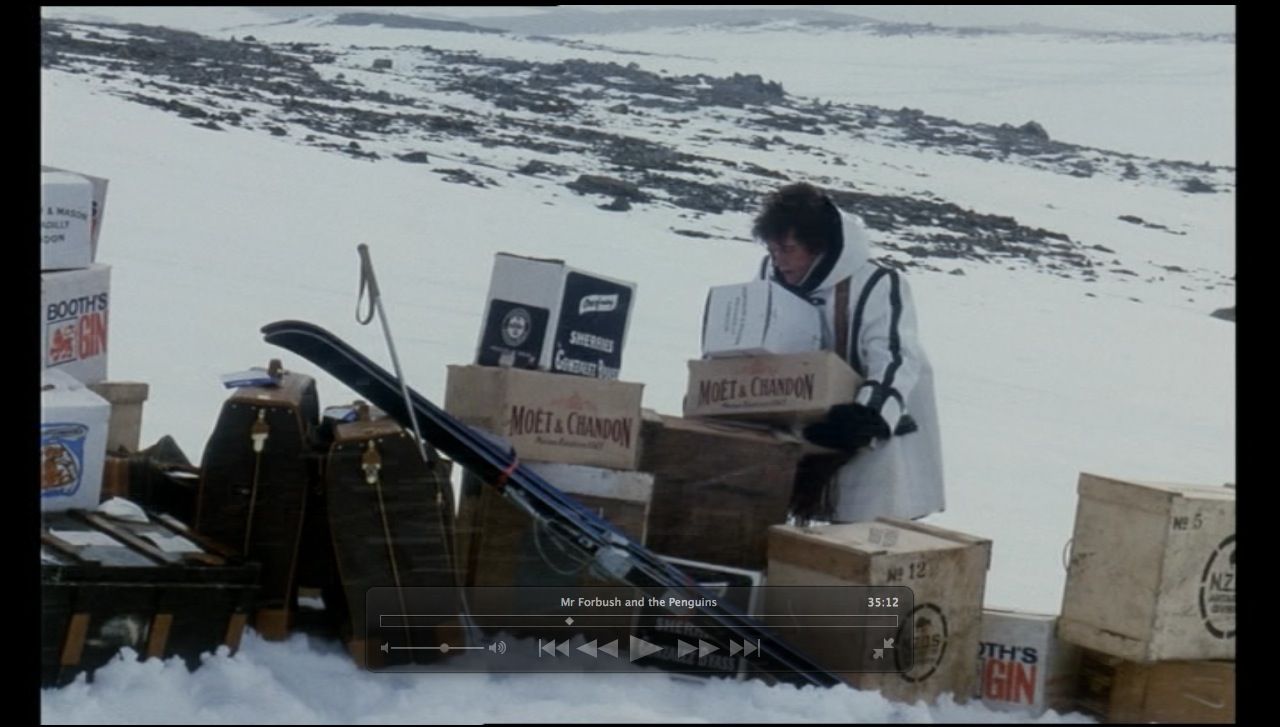
There are some clever visual ideas in the film: in one sequence early in the film, Forbush is asked to take a breathalyser test, and the camera dollies in to the breathalyser bag as Forbush breathes into it; a slow dissolve takes us to the police station as Forbush’s professor pays Forbush’s fine (an action depicted via a close-up of money being passed from Britton’s hands into the hands of the actor playing the police officer).
Audio
Audio is presented via a two-channel mono track. This is clean and clear throughout. Sadly, there are no subtitles.
Extras
Extras include a stills gallery (2:54) and a music suite (41:09). Given the complex production history, it would have been nice to see some more contextual material – perhaps some reflections by the people involved in the production.
Overall
Ultimately, Mr Forbush and the Penguins is an interesting but frustrating film: the ‘joins’ between Viola’s version of the film and the material added by Boulting’s crew are all too clear. The film features some odd tonal shifts and a confused approach to its central character. On the other hand, Hurt’s performance anchors the picture, and the sequences set in the Antarctic are very strong: Sucksdorff’s footage of the penguin colony is superb. The disc contains a pleasing presentation of the film. The music suite is a nice addition, although given the film’s difficult production some reflections from the participants would have helped to give this uneven picture a little more context. References: Leane, Elizabeth, 2012: Antarctica in Fiction: Imaginative Narratives of the Far South. Cambridge University Press Russell, Franklin, 1966: ‘Book Review: Death March of a Penguin’. Life. 25 March, 1966: 12 Taylor, Andy, 2010: ‘Mr Forbush and the Penguins’. [Online.] http://www.anthonyshaffer.co.uk/screenplays/forbushandpenguins.html This review has been kindly sponsored by: 
|
|||||

|